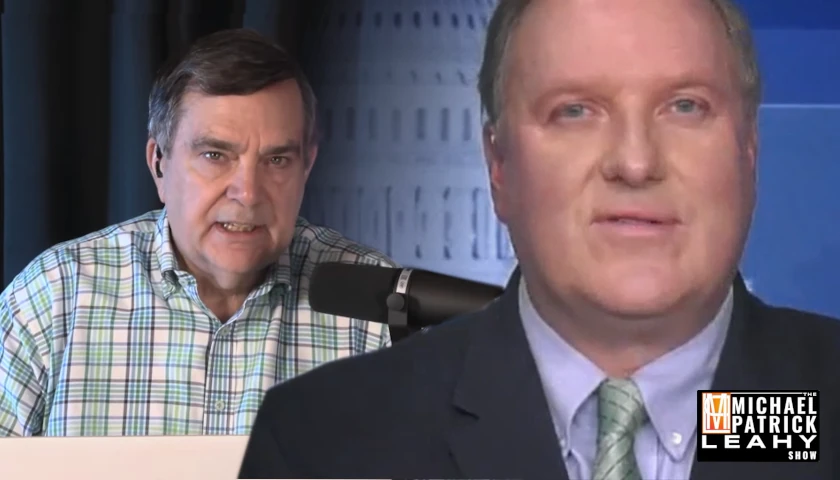State Representative Scott Cepicky (R-Culleoka) joined The Tennessee Star Report with Michael Patrick Leahy on Thursday to discuss the General Assembly’s legislative agenda for major educational reform, including triggers in kindergarten, first, and second grade designed to identify struggling students and provide them with tailored interventions to bridge the educational gap and accelerate academic success – particularly foundational reading and math skills.
TRANSCRIPT
Michael Patrick Leahy: And welcome back to The Tennessee Star Report. It is 11:19 a.m. We’re broadcasting live from our studios in Nashville, Tennessee. We are joined on the Newsmaker Line by our very good friend, State Representative Scott Cepicky from Maury County.
Scott, every member of the Tennessee House of Representatives and the Tennessee State Senate will have an agenda of bills that they want to promote in the Tennessee General Assembly when it reconvenes January 9th. What are some of the bills that you want to focus on?
Scott Cepicky: Well, two of the bills in education that I’ll be working very intently with Chairman White on is creating triggers in K1 and 2 for our students that are not on grade level to be able to get them the interventions and summer school help that they need so that they can take advantage of that.
You remember all the consternation we got about third-grade last year.
But let’s get these kids help earlier on so that we can mitigate these educational shortcomings with these students and get them caught up to speed as quick as we can.
Michael Patrick Leahy: So tell me first about the triggers – what would the trigger be? So you’re talking about a kid – kindergarten, first grade, second grade – who is having difficulty reading or doing math, how do you identify that and how do you fix it?
Scott Cepicky: Well, one of the things we do is we do three universal screeners that evaluate the progress of the student. And one of the things we’ve seen is the students that are performing below the 50th percentile on those screeners tend to be more behind than others and are going to enter the next grade level if we move them forward without help or interventions.
They’re going to start that next year behind, and that gap’s going to increase exponentially over time.
And so what we’re going to do is we’re going to use that last universal screener, probably use the 50th percentile mark, that if your student is struggling and they score below that, that they would have the opportunity to attend summer school or get those interventions the following year to make sure that they are up to speed and on track for their academic success.
Michael Patrick Leahy: Do you think that has had much success in the past when they’ve done summer school for kids in first grade?
Scott Cepicky: It has if it’s been high quality, and one of the things we heard from our teachers about the third-grade retention bill with the curriculum and the interventions we put in place in summer school that they thought was very good, very well done and the high quality affected these students to where we moved more kids forward out of that ‘approaching’ category to ‘on track’ than we’ve ever had before.
Well, getting them earlier will help us out.
Michael Patrick Leahy: Let’s go back to that third-grade retention bill was passed and there was a big brouhaha. ‘Oh, you’re, you know, you’re going to hold my child back. We’ll put them in summer school.’
I think in the end, what, only about 2 percent of third graders did the summer, the extra summer work. Is that right?
Scott Cepicky: Roughly about 1.3.
Michael Patrick Leahy: And you’re saying of that 1.3, I think we’ve had, what, one year of experience with that?
Scott Cepicky: Yes.
Michael Patrick Leahy: And are there some measurable successes for those, for that 1.3 percent of third-grade kids that went through that retention?
Scott Cepicky: Yes, when they moved on to fourth grade, we’ve been tracking them through the universal screeners that they take in fourth-grade and the students that were ‘approaching’ in third grade that they went to summer school and then move forward getting the help with tutoring are showing on their universal screeners in fourth-grade that they’re on track.
So we’ve closed that gap and moved them forward to where now they’re on track in fourth grade to know the material and be able to hopefully tell us that on the TCAP test at the end of the year.
Michael Patrick Leahy: All right. Well, that’s a good sign. You had a couple other bills that you’re going to be introducing.
Scott Cepicky: We’re working on math right now, Michael.
You know, we put all this effort in the reading, but our math scores have not moved at all since COVID. In fact, they’ve gotten worse. And so we’re working on putting together a math bill with some of the same kind of supports as we had with the reading bill, but with no retention involved here because mathematics is one of those things that builds through the first-grade to eighth-grade.
But making sure we have the academic support there for our students, make sure our teachers are trained properly, and how to teach mathematics in Tennessee going back to the foundational basics.
Michael Patrick Leahy: Shouldn’t math teachers in Tennessee already know how to teach math?
Scott Cepicky: They do. And but there’s been so many different maths that’s come out.
We want to make sure that the math that we’re going to focus on will be taught the same across the State of Tennessee. So not only if students move from one district to another, they’re being taught the same thing, but also if teachers move from one district to another for a job that they understand on how they’re going to deliver mathematics in the State of Tennessee.
Kind of a hodgepodge right now across the state. We’re going to try to get it more in line with what we know works.
Michael Patrick Leahy: So, when you talk about that, there are different techniques for teaching math. And what you’re saying is right now, it’s sort of a free-for-all in elementary school for teaching math?
Scott Cepicky: That’s correct.
Michael Patrick Leahy: Is it the methodology or is it the teacher or is it some combination thereof?
Scott Cepicky: It’s a combination of both, Michael.
I guess the two terms that most people would be familiar with is numeracy and fluency, and there’s different levels of how that’s being taught.
Numeracy is how old school math was, where you memorized things, and it’s more of the crunching of the numbers and memorization and then fluency is how you can apply the knowledge you have.
Two plus two is four. That’s numeracy.
Fluency is, okay, what are the other ways to equate the four?
And therefore the students have to manipulate those in their heads.
That’s where you get the depth, knowledge, and understanding. That’s what we’re going to go back to how it used to be taught in days gone by.
Michael Patrick Leahy: As long as two plus two does not equal five, right? We’ve had a little bit of that out there, haven’t we?
Well, so it sounds like you want to move towards a specific methodology of teaching.
Now, I’ve heard of a couple out there. Some are a bit controversial.
One of them that comes to mind is Saxon math. Is that one of these that would be in the list of possible math methodologies?
Scott Cepicky: That is correct, yes.
Michael Patrick Leahy: Are you going to hone in on one particular meth methodology or just say, ‘Across Tennessee, we’re going to only use these two;’ or what are your thoughts on that?
Scott Cepicky: Well, I think what you’ve got to do is you’ve got to first identify the best practices for a teacher to know and understand on how to deliver the concept of math that we want taught: the numeracy and the fluency.
Saxon math is one of those that delivers both numeracy and fluency to students, but teachers are going to have to be trained just like with the science of reading and phonics.
You’re going to have to be trained and understand how to deliver that because, you know, most of your older teachers would understand that, but a lot of the newer ones haven’t been taught that in colleges. And so we’re going to have to get not only the existing teachers on board with this pathway, but also getting our education prep providers with their curriculums on teaching the next generation of teachers in Tennessee about how we’re going to get them on board with this, too.
So it’s going to be a pretty big lift.
Michael Patrick Leahy: Yeah, it is interesting because you would think that I’m surprised that we don’t have like, you know, two or three math methodologies that have been, the approved ones in the state already. And then the training becomes a big issue. I’ve heard some teachers, they don’t like this methodology; they don’t like that methodology.
Are you getting any pushback from teachers, or teachers unions, or administrators for specifically defining a particular Math teaching methodology?
Scott Cepicky: No, not really, Michael. It’s been the contrary to that – there’s been a lot of support of wanting to understand exactly where we’re going; let’s go there and let’s stay on track.
I think what a lot of people, and you probably know this, every every couple of years, the General Assembly or the Department of Education flips on what they’re going to do. And I think if you have the General Assembly more involved in this decision making, it becomes something that gets more solidified moving forward that, ‘Hey, let’s, let’s get out of the education reform business; let’s get in the education business.’
We’re in Tennessee. Hey, this is what we’re going to do. We know this works. Here’s the data we can back it up with and then get everybody on board because the end result is our kids are not being taught math that is being retained with them because I can show you the math scores and they deteriorate over the years.
Michael Patrick Leahy: Well, so you’re going to introduce this bill that will standardize a couple of math methodologies and train teachers on it.
How do you expect, how do you anticipate your colleagues in the State House and the State Senate will respond? Do you anticipate this will be a challenge or universal support for it?
Scott Cepicky: I think it’ll be something pretty broad support on both sides of the aisle because all I have to do is roll out the math scores that are out there that everybody knows are atrocious. And we’ve got to get this thing turned around. You just can’t focus all on reading. You’ve got to bring math along too, because that makes up the whole educational background and abilities of that student.
They have to be able to master reading, they have to be able to master English language arts, and they have to be able to master math. So that when they do graduate high school, they have the opportunities put forth by them of, of higher education TCAT, or even serving in the military.
Michael Patrick Leahy: Scott Cepicky, state representative from Murray County.
Scott, I think that’s a terrific bill. We will be watching its progress in this session of the Tennessee General Assembly.
Thanks so much for joining us today.
Scott Cepicky: Merry Christmas, everybody.
Michael Patrick Leahy: Merry Christmas to you, Scott; down in Columbia, Maury County.
We’ll have more when we get back.
You’re listening to The Tennessee Star Report.
I’m Michael Patrick Leahy.
– – –
Listen to The Tennessee Star Report with Michael Patrick Leahy weekdays from 11:00 am to 1:00 pm on WENO AM760 The Flame.




